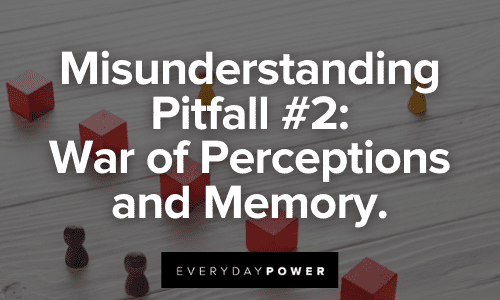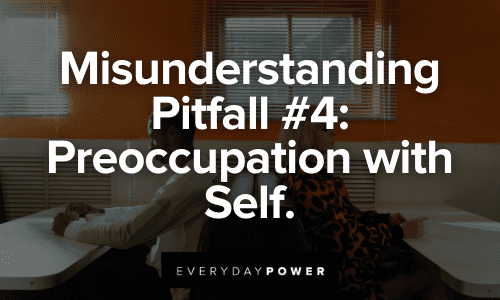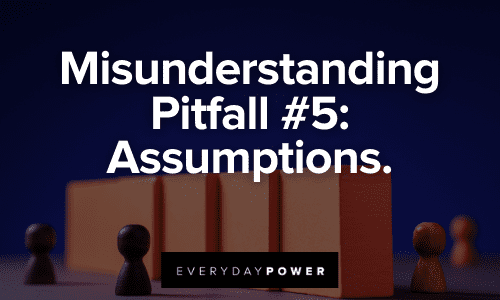5 Misunderstandings That Will Cause Problems In Your Closest Relationships
Misunderstandings are the root of conflict in many relationships.
It
can range from minor misunderstandings (“I thought you said left!”) to toxic
misunderstandings (“Were you flirting with her?”). They cause stress,
frustration, turmoil, and probably the worst perpetrator, not feeling heard or
understood.
By Erika Boissiere
Over time, if a person continues to feel unheard by their partner, distance takes over.
While every relationship encounters a misunderstanding from time to time, there are some relationships that are plagued by them.
Misunderstandings, simply defined, are when two people’s perceptions collide. Your partner thinks of the situation in one way, and you see it in another.
As a couples therapist, my job is to help couples communicate and to teach effective strategies on how to navigate through these miscommunications.
Here are the five most common reasons couples, or those in relationships, misunderstand each other.
Why a Misunderstanding Happens Between Couples
Misunderstanding Pitfall #1: Mind-Reading.

“Mind-reading” is a cognitive-behavioral therapy tool that speaks to the idea that we sometimes mind-read other people, and we also expect others to mind-read us. Misunderstandings root from the very idea that we expect others to simply “just know” what we are thinking or feeling, without ever speaking to them about it.
Take, for example, you’re at work and your co-worker is being distant. This is not typical of her, so you think to yourself, “maybe it’s because of that meeting we had yesterday. I was a little aggressive.” In response, you get a little peeved that your co-worker is being so sensitive. You create distance. You don’t mention the issue, but suddenly, both of you are distant from each other.
Now imagine, just for a second, that you don’t really know why they’re upset. You have a hypothesis. Simply that. You might be right, you might be wrong, or you might be somewhere in the middle.
Maybe she had a bad day. Maybe her cat died. She might have gotten terrible sleep. Perhaps you were aggressive in the meeting. The point is this: often, we mind-read situations, and then base major relationship decisions off of them. To make matters worse, we could be completely wrong!
To end mind-reading, we simply ask our co-worker, our spouse, or partner: “I want to check-in with you about something…” and through not assuming, and being open to the myriad of responses we might receive, we’ve opened up a major channel of communication—and avoided a misunderstanding.
Misunderstanding Pitfall #2: War of Perceptions and Memory.

Another pitfall that many relationships fall into is the battle of perceptions. Some people believe that their perception is the absolute truth. There is a core belief that the perception is a fact, and NOT arguable. While this may feel right in the moment, it can cause a misunderstanding.
To complicate matters, people will often go into their memory banks, and say, “but this happened, and then this.” The other will say, “no, this happened.” And off to the races.
You must know this. Memory is faulty; it is not as reliable as we’d like to think. Research shows it repeatedly, yet so many of us are defensive about it and don’t allow for any wiggle room.
Also, rigidity in your perception can cause misunderstandings to worsen. Perceptions are subjective, not objective. The core relationship skill is to open yourself to this complexity, which ultimately allows you to hear your partner’s experience, without battling it out over details that may or may not be true.
Misunderstanding Pitfall #3: Being Right.

Another common misunderstanding pitfall that will ruin any relationship is an obsession with being “right.” If you are in a conflict, and your goal is to prove the other wrong, you are setting yourself up for an even bigger fight.
The reason that letting go of “being right” is so important is that people want to be heard. People want to be understood. It rarely has to do with whether or not you’re right.
The more important skill to harness is uncovering the missing information that your partner holds, and not getting trapped in the “you’re wrong and I’m right” vortex. When misunderstandings take place, we want to ask our partner, “What happened? Why was it important to you? What can I do differently? What upset you the most?”
Let go of being right; it is a battleground that results in very little, and if done enough times, can cost you your relationship.
Misunderstanding Pitfall #4: Preoccupation with Self.

So many relationships fall into the victim trap. People will say things like, “How could they..” OR, “if they would just listen to me!” While the victim’s stance allows you to feel justified, it is often a roadblock to resolving a misunderstanding.
When individuals become preoccupied with themselves, they miss the opportunity to understand the other partner’s perspective. How will you know when you’re in this place? The best tool is to check in with yourself during the conflict. Ask: “how interested am I in learning about what happened to my partner?”
If you find you are only concerned with having your story be heard, then you are in a state of being preoccupied with yourself. Stop, take a deep breath, and as compassionately as you can, listen. When your partner is done speaking, then talk to them about your experience.
Misunderstanding Pitfall #5: Assumptions.

There are so many misunderstandings that are based on assumptions.
Terry Real, a famous couples’ therapist, taught me this skill to teach my clients. When you’re in a place of making an assumption about what your partner is thinking or feeling, say this phrase: “What I make up is…” OR “What I’m making up is…” This simple statement allows you to get out of “assumption land,” and into your perceptions about the event.
You don’t know how someone is feeling. You don’t know what someone is thinking. And you also don’t know if you have all the facts.
Why this tool is so helpful to couples is that it tells your partner how you internalize your relationship. It allows your partner to correct your narrative.
Perceptions are what we want to work with when we’re in a place of misunderstandings, not, assumptions. Because at the end of the day, that’s really all a misunderstanding is: a perception difference.
